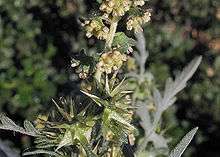Ambrosia acanthicarpa
| Ambrosia acanthicarpa | |
|---|---|
 | |
| Scientific classification | |
| Kingdom: | Plantae |
| (unranked): | Angiosperms |
| (unranked): | Eudicots |
| (unranked): | Asterids |
| Order: | Asterales |
| Family: | Asteraceae |
| Tribe: | Heliantheae |
| Genus: | Ambrosia |
| Species: | A. acanthicarpa |
| Binomial name | |
| Ambrosia acanthicarpa Hook. | |
| Synonyms[1] | |
| |
Ambrosia acanthicarpa is a North American species of bristly annual plants in the sunflower family. Members of the Ambrosia genus are called ragweeds. The species has common names including flatspine bur ragweed,[2] Hooker's bur-ragweed,[3] annual burrweed, and annual bur-sage, and western sand-bur. The plant is common across much of the western United States and in the 3 Prairie Provinces of Canada.[4][5]
This spiny, weedy plant grows in clumps of many erect stems which may reach over a meter in height. Its gray-green stems are covered in a coat of stiff, bristly hairs. The few rough leaves are several centimeters long. The racemes of flowers are more plentiful, with each hairy flower head a few millimeters wide. The spiny, burr-like pistillate heads have pointed, twisting bracts and the staminate heads are rounded. The species is adaptable and grows well in disturbed areas, easily becoming weedy.[6]
References
- ↑ The Plant List Ambrosia acanthicarpa Hook.
- ↑ "Ambrosia acanthicarpa". Natural Resources Conservation Service PLANTS Database. USDA. Retrieved 8 January 2016.
- ↑ "BSBI List 2007" (xls). Botanical Society of Britain and Ireland. Archived from the original on 2015-02-25. Retrieved 2014-10-17.
- ↑ Biota of North America Program 2013 county distribution map
- ↑ Great Plains Flora Association. 1986. Flora of the Great Plains i–vii, 1–1392. University Press of Kansas, Lawrence.
- ↑ Flora of North America Vol. 21 Page 15 Ambrosia acanthicarpa Hooker, Fl. Bor.-Amer. 1: 309. 1833.